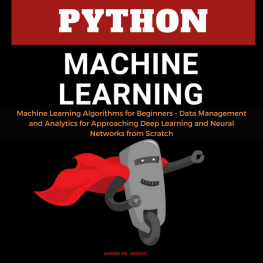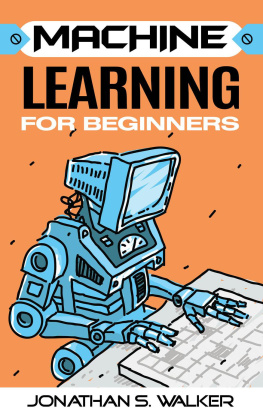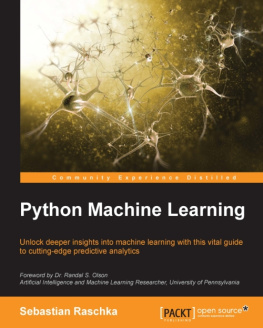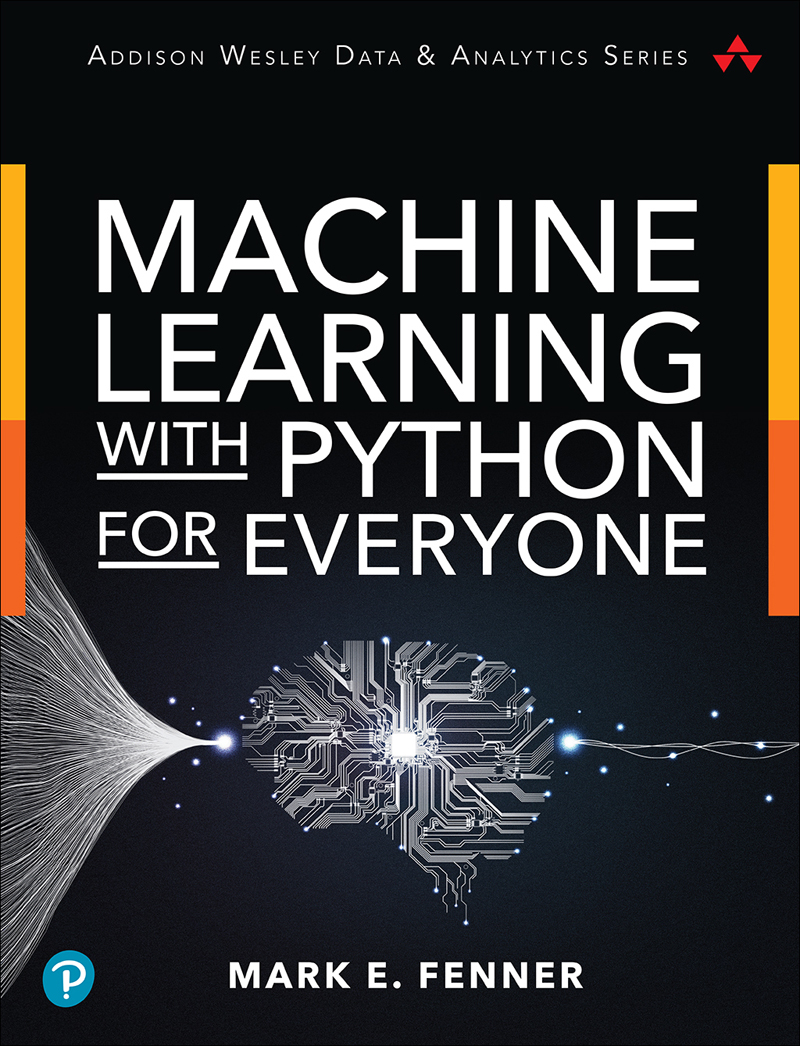The figure depicts the information of Pearson Addison-Wesley data and analytics series. Various titles such as deep learning with the tensor flow, pandas for everyone, R for everyone, Visual data story-telling with Tableau, and Hadoop and spark fundamentals. The website provided at the bottom reads, "informit.com/awdataseries." The titles in this series focus on infrastructure, algorithms, and visualizations. The following social network icons are shown at the bottom of the page: Facebook, YouTube, twitter, and feed.
Machine Learning with Python for Everyone
Mark E. Fenner

Boston Columbus New York San Francisco Amsterdam Cape Town
Dubai London Madrid Milan Munich Paris Montreal Toronto Delhi Mexico City
So Paulo Sydney Hong Kong Seoul Singapore Taipei Tokyo
Many of the designations used by manufacturers and sellers to distinguish their products are claimed as trademarks. Where those designations appear in this book, and the publisher was aware of a trademark claim, the designations have been printed with initial capital letters or in all capitals.
The author and publisher have taken care in the preparation of this book, but make no expressed or implied warranty of any kind and assume no responsibility for errors or omissions. No liability is assumed for incidental or consequential damages in connection with or arising out of the use of the information or programs contained herein.
For information about buying this title in bulk quantities, or for special sales opportunities (which may include electronic versions; custom cover designs; and content particular to your business, training goals, marketing focus, or branding interests), please contact our corporate sales department at or (800) 382-3419.
For government sales inquiries, please contact .
For questions about sales outside the U.S., please contact .
Visit us on the Web: informit.com/aw
Library of Congress Control Number: 2019938761
Copyright 2020 Pearson Education, Inc.
Cover image: cono0430/Shutterstock
Pages : Screenshot of seaborn 20122018 Michael Waskom.
Pages : Screenshot of seaborn heatmap 20122018 Michael Waskom.
Pages : Screenshot of seaborn swarmplot 20122018 Michael Waskom.
Page : Screenshot of seaborn stripplot 20122018 Michael Waskom.
Pages : Screenshot of seaborn implot 20122018 Michael Waskom.
Pages : Screenshot of seaborn distplot 20122018 Michael Waskom.
Pages : Screenshot of Manifold 20072018, scikit-learn developers.
Page : Screenshot of cluster 20072018, scikit-learn developers.
Pages : Image of accordion, Vereshchagin Dmitry/Shutterstock.
Page : Image of fighter jet, 3dgenerator/123RF.
Page : Screenshot of seaborn jointplot 20122018 Michael Waskom.
All rights reserved. This publication is protected by copyright, and permission must be obtained from the publisher prior to any prohibited reproduction, storage in a retrieval system, or transmission in any form or by any means, electronic, mechanical, photocopying, recording, or likewise. For information regarding permissions, request forms and the appropriate contacts within the Pearson Education Global Rights & Permissions Department, please visit www.pearsoned.com/permissions/.
ISBN-13: 978-0-13-484562-3
ISBN-10: 0-13-484562-5
ScoutAutomatedPrintCode
To my son, Ethan
with the eternal hope of a better tomorrow
Foreword
Whether it is called statistics, data science, machine learning, or artificial intelligence, learning patterns from data is transforming the world. Nearly every industry imaginable has been touched (or soon will be) by machine learning. The combined progress of both hardware and software improvements are driving rapid advancements in the field, though it is upon software that most people focus their attention.
While many languages are used for machine learning, including R, C/C++, Fortran, and Go, Python has proven remarkably popular. This is in large part thanks to scikit-learn, which makes it easy to not only train a host of different models but to also engineer features, evaluate the model quality, and score new data. The scikit-learn project has quickly become one of Pythons most important and powerful software libraries.
While advanced mathematical concepts underpin machine learning, it is entirely possible to train complex models without a thorough background in calculus and matrix algebra. For many people, getting into machine learning through programming, rather than math, is a more attainable goal. That is precisely the goal of this book: to use Python as a hook into machine learning and then add in some math as needed. Following in the footsteps of R for Everyone and Pandas for Everyone, Machine Learning with Python for Everyone strives to be open and accessible to anyone looking to learn about this exciting area of math and computation.
Mark Fenner has spent years practicing the communication of science and machine learning concepts to people of varying backgrounds, honing his ability to break down complex ideas into simple components. That experience results in a form of storytelling that explains concepts while minimizing jargon and providing concrete examples. The book is easy to read, with many code samples so the reader can follow along on their computer.
With more people than ever eager to understand and implement machine learning, it is essential to have practical resources to guide them, both quickly and thoughtfully. Mark fills that need with this insightful and engaging text. Machine Learning with Python for Everyone lives up to its name, allowing people with all manner of previous training to quickly improve their machine learning knowledge and skills, greatly increasing access to this important field.
Jared Lander,
Series Editor
Preface
In 1983, the movie WarGames came out. I was a preteen and I was absolutely engrossed: by the possibility of a nuclear apocalypse, by the almost magical way the lead character interacted with computer systems, but mostly by the potential of machines that could








